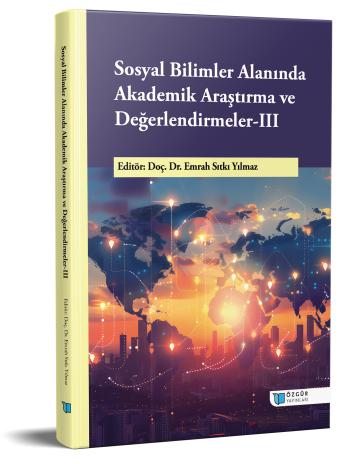
Türkiye’de Kentleşme Hızı ile Kamu Gelir ve Giderleri Arasındaki Etkileşim Üzerine Ampirik Bir İnceleme
Şu kitabın bölümü:
Yılmaz,
E.
S.
(ed.)
2024.
Sosyal Bilimler Alanında Akademik Araştırma ve Değerlendirmeler-III.
Özet
Küreselleşmeyle birlikte dünya genelinde artan kırdan kente göç ve kentleşme oranı artmaktadır. Bu artışın sonucunda ülkelerin mali dengeleri etkilenebilmektedir. Bu etkileşim eğer iyi analiz edilmez ve yönetilmez ise ülkelerde sosyoekonomik ve politik açıdan çarpan etkisi olan ciddi sorunlar olan eşitsizlikler, enflasyon, yoksulluk ve işsizlik gibi yapısal sorunları beraberinde getirebilmektedir. Çalışma kapsamında 1960-2022 dönemi için Türkiye’de kentleşme hızı ile genel bütçe gelirleri ve giderlerindeki değişim arasındaki etkileşim zaman serileri yöntemleriyle incelenmiştir. Bu doğrultuda ilk olarak serilerin durağanlıkları araştırılmış ve yapısal kırılma tarihleri tespit edilmiştir. Ardından nedensellik ilişkileri Toda-Yamamoto (1995), Hacker-Hatemi J (2006) ve Balcılar vd. (2010) testleriyle sorgulanmıştır. Gözlem süresinin tamamına ilişkin nedensellik sorgulamaları kentleşme hızından genel bütçe gelir ve giderlerine doğru tek yönlü ilişkinin olduğunu ortaya koyarken Balcılar vd. (2010) tarafından geliştirilen zamanla değişen nedensellik testi değişkenler arasında dönemler farklılaşmakla birlikte nedensel ilişkinin olduğunu ve nedensellik ilişkilerinin ardışık hareket ettiğini ortaya koymuştur. Elde edilen bulgular doğrultusunda; Türkiye’de belli dönemlerde kentleşmenin vergi tabanını arttırma gibi etkileri nedeniyle mali açıdan fırsat olarak görülebildiği ancak sağlıksız/çarpık kentleşme olması durumunda orta uzun vadede kentleşmenin bütçeye yük getirebildiği tespit edilmiştir. Ayrıca kamu gelir ve giderlerindeki değişimlerin de belli dönemlerde kentleşme hızına neden olabildiği görülmüştür. Bu doğrultuda kentleşme sürecinin maliye politikaları kapsamında dikkatle takip edilmesi gerektiği, bütçeye kısa dönemli gelir sağlamak adına sosyoekonomik ve politik açıdan sonuçları orta-uzun dönemde ortaya çıkan imar affı, hazine arazilerinin plansız satışı ve gecekondulaşma gibi kent planlarını bozacak ve istikrarsızlığı arttıracak alanlara girilmemesi ve cari, yatırım ve transfer harcamalarında da kentleşme sürecinin sağlıklı ilerlemesi amacının öne çıkarılması gerektiği sonuçlarına ulaşılmıştır.

